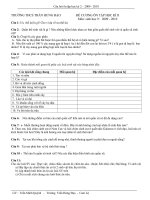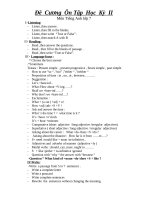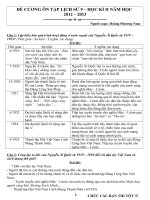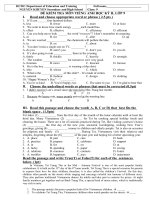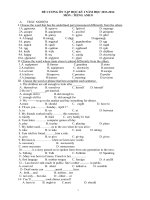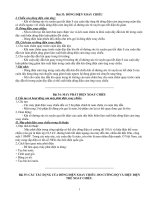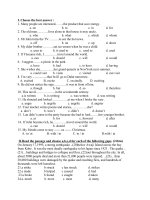- Trang chủ >>
- Đề thi >>
- Đề thi lớp 8
304 đề cương tiếng anh 9 học kì 1
Bạn đang xem bản rút gọn của tài liệu. Xem và tải ngay bản đầy đủ của tài liệu tại đây (59.94 KB, 5 trang )
ĐỀ CƯƠNG TIẾNG ANH 9 HỌC KỲ 1
MỤC LỤC
UNIT 1: A VISIT FROM PEN PAL
UNIT 2: CLOTHING
UNIT 3: A TRIP TO THE COUNTRYSIDE
UNIT 4: LEARNING A FOREIGN LANGUAGE
UNIT 5: THE MEDIA
Trang 2
Trang 13
Trang 24
Trang 35
Trang 47
Trang 1
ĐỀ CƯƠNG TIẾNG ANH 9 HỌC KỲ 1
UNIT 1: A VISIT FROM PEN PAL
I. GETTING STARTED
1. Temple of Literature (n): Văn Miếu
3. Đồng Xuân market (n): chợ Đồng Xuân
2. Revolutionary Museum (n): Viện bảo tàng
Cách Mạng
B. LISTEN AND READ
4. pen pal (n)
: bạn qua thư
11. mosque (n)
: thánh đường Hồi Giáo
5. correspond (v)
: trao đổi thư từ
12. to pray (v)
: cầu nguyện, cầu khẩn
-» correspondence (n): việc trao đổi thư từ
-» prayer (n): lễ c ầu kinh, kinh c ầu nguy ện
-» correspondent (n): người trao đổi thư
13. peace (n)
: hòa bình
tín, phóng viên
-» peaceful (adj): hòa bình
6. impress (v)
: gây ấn tượng
14. atmosphere (n) : bầu không khí
-» impressive (adj) : để lại ấn tượng
-» atmospheric (adj): thuộc không khí
-» impression (n) : ấn tượng, cảm giác
15. abroad (adv) : nước ngoài
7. modem (adj)
: hiện đại
16. depend (v)
: phụ thuộc vào
-» to modernize (v) : hiện đại hóa
-» dependence (n): sự phụ thuộc
-» modernization (n): sự hiện đại hóa
≠ independence (n): sự độc lập
8. beauty (n)
: cảnh đẹp
-» dependent (adj): phụ thuộc
-» beautiful (adj) : đẹp
# independent (adj): độc lập
-» beautifully (adv) : rất đẹp
-» dependently (adv)
-» beautify (v)
: làm đẹp
≠ independently (adv)
-» beautification (n): việc làm đẹp
17. in touch with sb: liên lạc với ai
9. friendly (adj)
: thân thiện
≠ out of touch with sb: mất liên lạc
-» friendliness (n) : sự thân thiện
-» to keep in touch with sb (v): giữ liên
-» friendship (n)
: tình bạn, hữu nghị
lạc với ai
10. mausoleum (n) : lăng tẩm, lăng mộ
III. READ
18. ASEAN (abbr)
: Association of South
-» Islamic (adj)
: thuộc về đạo Hồi
East Asian Nations: Hiệp hội các nước
28. religion (n)
: tôn giáo
Đông Nam Á
-» religious (adj) : thuộc về tôn giáo
19. divide (v)
: chia ra
29. Buddhism (n)
: đạo Phật
-» division (n)
: sự phân chia, phép chia
-» Buddhist (adj) : thuộc về đạo Phật
20. region (n)
: khu vực
-» Buddhist (n) : phật tử
-» regional (adj) : thuộc địa phương
30. Hinduism (n)
: đạo Hin-đu
21. separate (v)
: ngăn cách, tách ra
31. instruct (v)
: hướng dẫn
-» separate (adj) : riêng biệt, khác nhau
-» instruction (n) : sự hướng dẫn
-» separation (n) : sự ngăn cách, sự tách ra
-» instructor (n) : người hướng dẫn
22. comprise (v)
: bao gom, tạo thành
32. primary (adj)
: chính, quan trọng
23. tropical (adj)
: thuộc vùng nhiệt đới 33. option (n)
: sự chọn lựa
24. climate (n)
: khí hậu, thời tiết
-» optional (adj)
25. currency (n)
: tiền tệ
34. compulsory (adj) : bắt buộc, cưỡng
-» unit of currency (n): đơn vị tiền tệ
bách
26. official (adj)
: chính, chủ yếu
-» to compel (v): bắt buộc, cưỡng bách
27. Islam (n): đạo Hồi
-» compulsion (n) : sự
cưỡng bách
SOME COMMON PREPOSITIONS
1. include = comprise = be comprised of =
8. impolite of sb : bất lịch sự với ai
consist of = be composed of = be made up 9. impressed by
: gây ấn tượng bời
of: bao gồm
10. impression on : có ấn tượng về
2. correspond with : trao đôi thư tín với
11. In addition to : thêm vào đó
3. compulsory for
: bắt buộc đối với
12. kind of sb
: ai đó tốt bụng
4. depend on / upon : lệ thuộc vào
-» kind to sb : tốt bụng với ai
≠ independent of : không lệ thuộc
13. pray for
: cầu nguyện cho
Trang 2
ĐỀ CƯƠNG TIẾNG ANH 9 HỌC KỲ 1
5. divide into
: chia thành
14. rich in
: giàu có về
6. famous for
: nổi tiếng về
15. separate from : chia tách khỏi
7. for fun
: cho vui
IV. LANGUAGE FOCUS
1. THE PAST SIMPLE (Thì quá khứ đơn)
a. Form:
Positive (+)
S + was / were + A / N.
S + V2- ed + O.
Negative (-)
S + was / were + not + A / N.
S + did not / didn’t + V1 + O.
Was / Were + S + A / N ?
Did + S + V1 + O?
Interrogative (?)
Wh- + was / were + S +....?
Wh- + did + S + V1 +...?
b. Usage:
- Thì quá khứ đơn được dùng để diễn tả một hành động xảy ra trong quá kh ứ khi đ ề c ập đ ến th ời
điểm hành dộng đó xảy ra.
- Các trạng từ chỉ thời gian thường dùng: ago, yesterday, the other day, last year, last month, last
week, at that time,...
Ex: (1) They bought this house two years ago.
(2) The tree fell on the roof of the house last night.
(3) He was at home yesterday.
- Thì quá khứ đơn được dùng để diễn tả một thói quen trong quá kh ứ v ới các tr ạng t ừ nh ư every,
last, often
Ex: (1) My brother often went fishing when he was young.
(2) Did you cook dinner every Saturday?
- Thì quá khứ đơn được dùng để diễn tả một hành động kéo dài m ột quãng th ời gian trong quá
khứ và chấm dứt hẳn trong quá khứ.
Ex: (1) Bob lived in London for two years. Right now he is living in Philadelphia.
(2) My father served in the army from 1965 to 1975.
- Thì quá khứ đơn được dùng để diễn tả một chuỗi hành động trong quá kh ứ, hành đ ộng này x ảy
ra sau hành động kia.
Ex: He stopped his car, got out of it, shut all the windows, locked the door, then entered the house.
2. CLAUSES AFTER WISH
❖ Future wish:
S + wish(es) + S + would(not) + V1
Ex: (1) They will not visit their grandmother next week.
-» They wish they would visit their grandmother next week.
(2) Paul will make noise tonight because of his party.
-» I wish Paul wouldn’t make noise tonight.
❖ Present wish:
S + wish(es) + S + were (not)
+…
S + wish(es) + S + V-ed /V2 / didn’t V1 + O
S + wish(es) + S + could (not) + V1
+O
Ex: (1) My life isn’t interesting now.
-» I wish my life were more interesting.
(2) I cannot go to the party.
-» I wish I could go to the party
(3) She doesn’t have enough money to buy that house.
-» She wishes she had enough money to buy that house.
❖ Past wish:
S + wish(es) + S + had(not) + V3/ed
Ex: (1) He didn’t have time to attend the meeting yesterday.
-» He wishes he had had time to attend the meeting yesterday.
(2) What a pity! It rained so heavily last night.
-» I wish it hadn’t rained so heavily last night.
Trang 3
ĐỀ CƯƠNG TIẾNG ANH 9 HỌC KỲ 1
EXERCISE
I. Use the simple past tense:
1. I (wake) ____________up at five minutes past seven this morning.
2. While her husband was in the army, Joyce (write) ____________ to him twice a week.
3. She (study) ____________ English for two years, but she doesn’t study it now.
4. She (not know) ____________much about Marxism-Leninism at that time.
5. When I was a boy, I often (not go) ____________fishing with my uncle Jim.
6. They (go) ____________home after they had finished their work.
7. He (go) ____________ abroad last week?
8. My elder brother (join) ____________ the army when he was seventeen.
9. When I last saw him, he (not be) ____________ in good health.
10. When I was a boy, every holiday (seem) ____________ideal.
11. My brother (serve) ____________ in the army from 1980 to 1983.
12. Men have traveled since they first (appear) ____________on the earth.
13. She was fond of him, but 1 (not believe) ____________ that she (love) ____________ him.
14. Why the old lady (fall) ____________as she was getting into the taxi?
15. Jenny (study) ____________French for a few months last year.
II. Fill each gap in the sentences with a suitable word from the box.
food currency
religion
education language
climate
beauty
capital
atmosphere vacation
1. Australia’s ____________city is Canberra.
2. ____________is the money that is used in a particular country at a particular time.
3. This is an area of outstanding natural ____________.
4. The ____________in the room was so stuffy that I could hardly breathe.
5. When we retire, we’re going to move to a warmer ____________.
6. ____________is the belief in and worship of a god or gods.
7. Have you decided where you’re going for your ____________ this year?
8. She does research into how children acquire ____________.
9. As a child, he received most of his____________ at home.
10. There was lots of ____________and drink at the party.
III. Put the verb into the correct form.
1. I wish I (know) ____________how to dance.
2. Jane wishes she (go) ____________ to bed earlier last night.
3. I wish my friend (lend) ____________me his car for my date tomorrow night.
4. Jimmy wishes he (be) ____________old enough to drive a car.
5. I wish we (spend) ____________ our last vacation in Hawaii.
6. I wish I (lie) ____________on the beach now.
7. It would be nice to stay here longer. I wish we (not have) ____________to leave now.
8. I’m fed up with this rain. I wish it (stop) ____________.
9. Do you wish you (live) ____________ near the sea?
10. Sarah wishes she (can speak) ____________every language in the world.
11. Khalid wishes he (visit) ____________Big Ben when he was in London.
12. We all wish our team (play) ____________ better next time.
13. I wish I (can go) ____________to the moon for a vacation.
14. I wish you (not complain) ____________ all the time.
15. I often wish I (be) ____________really wealthy.
IV. Rewrite sentences, using “I wish…”:
Part A:
1. It won’t be fine tomorrow.
I wish..........................................................................................................................................................................................
2. He will leave for Ha Noi next Sunday.
I wish..........................................................................................................................................................................................
3. She won't take this course.
Trang 4
ĐỀ CƯƠNG TIẾNG ANH 9 HỌC KỲ 1
Trang 5
